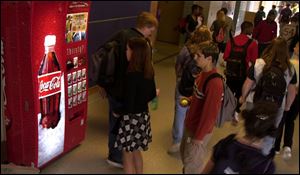
Doctors say soda, schools don t mix
1/6/2004
The Toledo schools have a 10-year contract to put Coca-Cola machines in their buildings.
School districts should restrict sales of soda pop because of the health problems that overconsumption can cause for students, according to the American Academy of Pediatrics.
The newly issued policy statement - intended for school board members, school officials, parents, and health care professionals - cites the link between soft drink consumption and increasing obesity and dental problems among America s youth.
Too many students, the academy said, are consuming sugar drinks instead of milk needed to build healthy, strong bones.
“School officials and parents need to become well informed about the health implications of vended drinks in school before making a decision about student access to them,” the policy states.
Soft drink sales have been an issue for many months in Toledo Public Schools and at other northwest Ohio and southeast Michigan school districts where major pop companies have dangled the offer of needed cash in exchange for visible advertising and vending machines.
David Welch, who was named president of the Toledo board of education last night, has urged the district to re-examine its 10-year contract with Coca-Cola, citing the health concerns of pop consumption.
But he acknowledged that the district s financial realities make it an offer that is truly difficult to refuse.
TPS received a $4.5 million advance from the soft drink company that is distributed annually to a capital building fund and the general fund. Any alteration of the contract would require repayment of remaining funds and possibly penalties.
“A lot of times it comes down to economics and dollars,” Mr. Welch said. “When they dangle that carrot in front of you, it s hard to say no when you re looking at laying off teachers or larger class sizes.”
Hugh Caumartin, superintendent of Bowling Green schools, said the junior high and high schools have some vending machines, but the district does not have a contract with a soft drink seller.
“We ve been approached, but we ve decided not to go in that direction,” he said. “It s the strings attached - the long-term commitment.”
The Bowling Green district limits the time the vending machines are available to students. Sales have increased for water, Mr. Caumartin said.
While he said he understands the academy s statement, he said a change in society s tastes would do more to improve student health related to soda pop.
“That usually comes from home. Society as a culture has to take a look at how it wants to behave. Nutrition being one of the issues that is there,” Mr. Caumartin said. “We just reflect the communities we serve. If the kids didn t like certain things, they wouldn t buy them.”
John Adler, president of the Washington Local Schools board, voted against the district entering into a contract with a soft drink provider. The measure was approved, 3-2.
He applauded the academy s decision to take a policy stand.
“I hope that we get [pop] out of the schools,” he said. “I hope they finally wake up to the fact that it is not good for kids.”